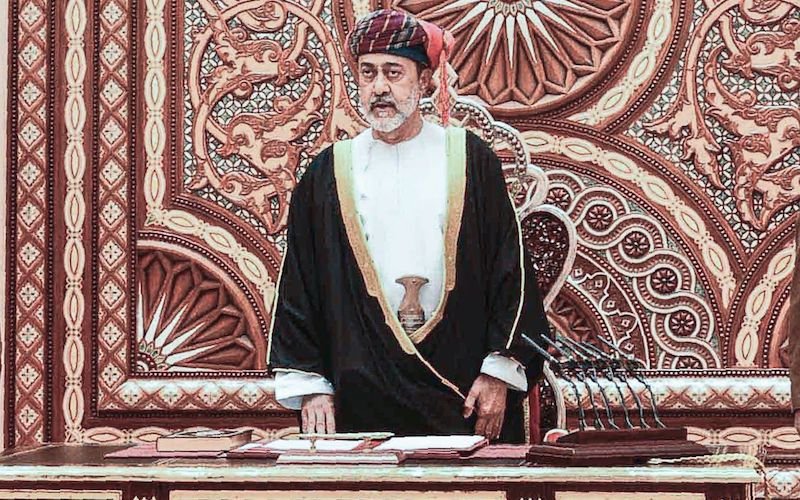Who is Oman’s new ruler Haitham bin Tariq?
The new leader was sworn in as the ruler of Oman, succeeding his cousin Sultan Qaboos who died at age 79
Photo: Courtesy Gulf Business

Oman’s new sultan takes charge of a nation that has known only one ruler for the past half-century. And while the country Haitham bin Tariq now leads is nothing like the impoverished backwater his cousin Qaboos took over back in 1970, he, too, is grabbing the reins in complicated times.
Qaboos, who died on Friday at 79, oversaw the transformation of Oman from a collection of sleepy villages to a developed nation powered by oil revenue. A foreign policy maverick, he also cemented his country’s reputation as an oasis of calm in a turbulent region.
But Oman, strategically located near key oil shipping lines at the eastern tip of the Arabian Peninsula, has been struggling for years to pull itself out of an economic slump, and the quiet quashing of dissent has become commonplace. Under Haitham, Qaboos’s handpicked successor, the small nation famous for its independent ways may also need to rethink alliances.
What Do We Know About Haitham Bin Tariq?
Not much. The new leader has held governmental positions over the last three decades, including minister of culture and heritage, general secretary of foreign affairs and head of the Anglo-Omani society. He also led the Oman Vision 2040 committee, the country’s economic and social development strategy.
Unlike some of his brothers and his predecessor, who died on Friday at 79, he doesn’t have a military background, and was assigned economic, sports, cultural and foreign policy portfolios before ascending the throne. He is also thought to have strong ties to traditional ally Britain and neighboring Gulf Arab states.
A 2009 cable from the US embassy in Muscat, leaked by WikiLeaks, said he’s invested his own money in media, advertising, telecommunications, tourism, energy services and construction. But he’s earned a special reputation for his real estate holdings. His elevation to the sultanate defied the prediction of one US diplomat, who speculated that one failed project may have “tarnished” Haitham’s prospects of taking the throne.
What Are Some of the Challenges Sultan Haitham Faces?
Lifting Oman out of economic stagnation may be his biggest challenge.
“The new leader faces three economic challenges: controlling the increase in public debt, preserving the currency peg and diversifying the economy away from oil,” said Bloomberg’s chief Middle East economist, Ziad Daoud. “The first two issues require urgent action; and as head of the Oman Vision 2040 committee, he would understand the difficulties of achieving diversification.”
The finances of the largest Arab crude producer outside the Organization of Petroleum Exporting Countries have been battered by a slump in oil prices. Oman plans to borrow 2bn rials ($5.2bn) to bridge the bulk of its 2020 budget deficit, which is expected to reach 2.5bn rials this year. The country’s debt is rated as junk by all three major rating companies, and two of them have a negative outlook.
Gross domestic product is expected to expand by 1.5 per cent in 2019 and 2.8 per cent in 2020, according to a Bloomberg survey of economists.
The economic situation was at the root of protests in 2011 “and it has only worsened since the fall of oil prices in 2014,” said Mar Valeri, an Oman expert at the University of Exeter. “The process of diversifying sources of revenue of the state has been extremely slow.”
This situation may determine Haitham’s relations with its richer neighbors, Valeri said.
Will Oman’s Foreign Policy Change?
By anointing Haitham as his successor, Qaboos may have seen him as continuing his own path. But Oman’s needs have been changing, as have its old alliances. The sultanate has historically enjoyed a close relationship with the UK, but London’s own Brexit-fueled economic needs have seen it shift priorities to Oman’s wealthier neighbors.
Qaboos’s fiercely unorthodox foreign policy kept some of Oman’s richer Gulf neighbors at arm’s length, and relations with the United Arab Emirates have been particularly tense. But if Haitham embarks on an effort to jump-start the economy, he may consider strengthening some of those ties. More affluent Gulf states have stepped in to support struggling Arab states economically in the past, but Oman has been unwilling to pay the political cost of lost independence.
To maintain its independence, Oman has to balance the UAE and Saudi Arabia, said Kristin Smith Diwan, a senior resident scholar at the Arab Gulf States Institute in Washington. “Courting their economic engagement while deflecting any infringements on Oman’s sovereignty,” she said.
“It’s a tough act.”
The article originally appeared in Gulf Business.